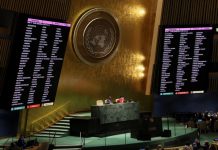US Secretary of State Antony Blinken has said that no one is interested in a civil war in Afghanistan, but added that it might be a possible scenario once the US military leaves the country.
Talking to CNN, in response to a question on concerns that Biden’s plans to withdraw US forces from Afghanistan by September 11 could create a vacuum that leads to civil war or another Taliban takeover, Blinken said: “That is certainly a possible scenario.”
But he reiterated that “no one has an interest in renewed civil war in Afghanistan, certainly the Afghan people don’t.”
“Neither the Afghan government or the Taliban do, none of Afghanistan’s neighbours do, neighbours and other countries in the region that have basically been free riders for the last 20 years, as we’ve been engaged there with our NATO allies and partners,” Blinken said.
The countries in the region “are now going to have to decide, given their interests in a relatively stable Afghanistan, given the influence that they have, whether they’re going to try to use that influence in a way that keeps things within the 40-yard lines.”
“So a lot of people are having their minds concentrated by the President’s decision,” Blinken added.
He reiterated that even as the US is withdrawing its forces, “we are not disengaging from Afghanistan, we’re remaining deeply engaged in the diplomacy in support for the Afghan government and its people, development, economic assistance humanitarian assistance, support for the security forces.”
ZALMAY KHALILZAD: US special envoy Zalmay Khalilzad on Tuesday testified before the Senate Foreign Relations Committee on US policy in Afghanistan where lawmakers questioned him about how Afghan women will be protected if the Taliban takes control after American troops leave the country.
Khalilzad said he believes Pakistan understands the impact of civil war in Afghanistan. Peace is still possible in Afghanistan as Washington has started to withdraw its remaining troops from the country, he added.
“Pakistan’s leaders have emphasized publicly and to US officials that they do not support a military takeover by the Taliban. I believe they understand that not only Afghanistan, but their country too will face grave consequences in the event of a return to a wider civil war,” he added.
Keeping US forces in Afghanistan did not make sense as the conflict could not be solved by continued fighting, Khalilzad said, adding that the US is helping the Kabul government find contractors to replace the departing American ones.
“The Afghans … with our help are looking for others to be able to provide that service to them,” he continued. “We’re obviously very sympathetic to them to find alternatives.”
The February 2020 deal reached by the Trump administration with the Taliban required the departures by May 1 of all US troops and non-diplomatic civilian personnel, including US contractors.
US OFFICIALS ORDRED TO LEAVE: The United States has ordered non-essential staff to leave its Kabul embassy, citing increased threats as Washington prepares to end its 20-year war in Afghanistan.
The order came two weeks after President Joe Biden announced that US troops, currently about 2,500, would leave by September.
The State Department said in a travel advisory that it had “ordered the departure from US embassy Kabul of US government employees whose functions can be performed elsewhere”.
Ross Wilson, the acting US ambassador in Kabul, said the State Department took the decision “in light of increasing violence and threat reports in Kabul”.
Meanwhile, General Kenneth McKenzie, head of the US Central Command, said that he administration remains committed to keeping a functioning embassy in Kabul.
“It is our intention to maintain an embassy in Afghanistan going forward. But we’ll have a very, very minimal military presence there – that which is strictly necessary to defend the embassy,” he said in remarks to the American Enterprise Institute.









